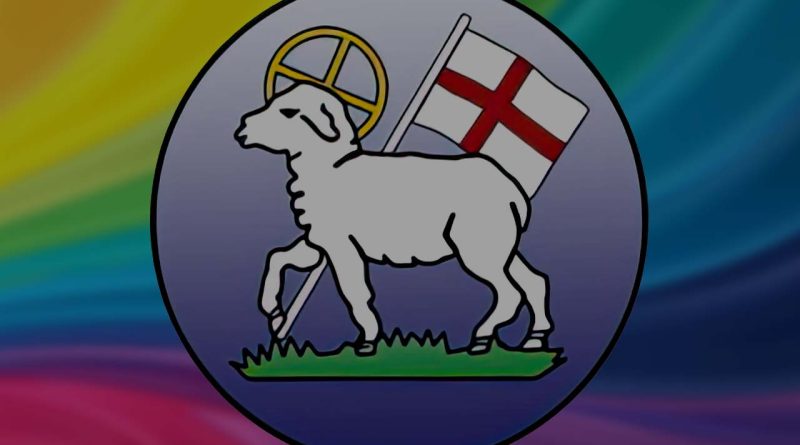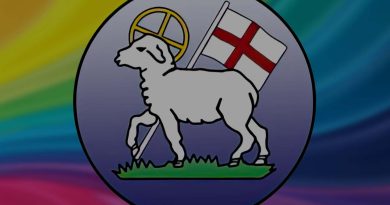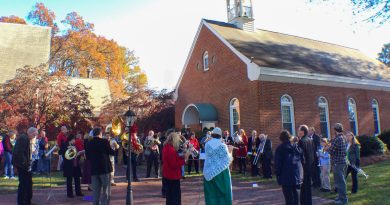Northern Province: Ordination of Gay & Lesbian Individuals
RE: The ordination and pastoral service of gay and lesbian individuals, whether single, married, or in covenanted relationships
- Whereas, the Moravian Church Northern Province has been prayerfully addressing the topic of sexual orientation and the participation of gay and lesbian persons in the church since the 1974 Synod by passing the following resolutions:
1974
“RESOLVED: (29) that the Moravian Church reaffirm its open welcome to all people by specifically recognizing that the homosexual is also under God’s care; and be it further
“RESOLVED: (30) that the Moravian Congregations will extend an invitation to all persons to join us in a common search for wholeness before God and persons; and be it further
“RESOLVED: (31) that as Christians, recognizing our common sinfulness and the miracle of God’s grace, accepting God’s pardon, and together striving to help free each other from bonds of fear, despair and meaninglessness, fitting us for lives of commitment, responsibility, witness, service, and celebration in God’s Kingdom, we will share in this venture as children of God and brothers and sisters in Christ toward wholeness.”
1994
“RESOLVED: (31) All segments of the Moravian Church (provincial, district, regional, congregation, individual) be encouraged to continue in prayer as individuals and as groups for openness to the leading of the Holy Spirit with regard to our understanding of the issue of homosexuality.
“RESOLVED: (32) The 1994 Northern Provincial Synod reaffirms the Homosexuality Resolution of the 1974 Resolutions of the Moravian Church Northern Province on Social Issues…(As noted above)
“RESOLVED: (33) Although the Moravian Church is not agreed on the question of the acceptability of homosexual practice, congregations are urged to make available support systems for people whose lives are affected by homosexual issues and to encourage individuals to seek appropriate training to lead such groups; and be it further
“RESOLVED: (34) ‘Certain basic human rights and civil liberties are due all persons. We are committed to support those rights and liberties for homosexual persons. We see a clear issue of simple justice in protecting their rightful claims.’ (from the Book of Discipline of the United Methodist Church, 1992) Moreover, we condemn acts of violence and coercion against persons who are homosexual or are perceived to be homosexual.
”RESOLVED: (35) The 1994 Northern Provincial Synod affirms the intention of the Provincial Elders’ Conference, Northern Province, to develop balanced educational materials on homosexuality for use in congregations in their quest for understanding on this issue.”
1998
“RESOLVED: (7) The Provincial Synod of 1998 affirms and commends the research, resolve, and courage of the Eastern District Christian Education Commission, the EDCEC Church and Society Committee, the Saturday Forum Planning Committee, and the panel participants for planning and bringing the Saturday Night Forum on homosexuality to Provincial Synod of 1998; and be it further
“RESOLVED: (8) The 1998 Provincial Synod thanks all those who attended and participated in the Forum for their openness and soul-searching courage; and be it further
“RESOLVED: (9) The delegates to the Provincial Synod of 1998 shall encourage the members of their home districts to continue a dialogue on homosexuality and other sensitive issues within the church.”
2002
“RESOLVED: (1): The 2002 Synod of the Moravian Church, Northern Province shall recommend full participation (membership, activities, and lay leadership) in the congregation for all persons, regardless of sexual orientation; and be it further
“RESOLVED: (2): The 2002 Synod of the Moravian Church, Northern Province shall affirm the resolutions of the Synods of 1974 and 1994 concerning homosexual persons; and be it further
“RESOLVED: (3): The Human Sexuality Task Force shall be commended for its efforts and the congregations of the Northern Province shall be urged to distribute this guide to their members and use it in their congregational programming; and be it further
“RESOLVED: (4): Every member of the Moravian Church shall be urged to pray that the Holy Spirit will guide our understanding of the issues pertaining to sexual orientation and direct us all to our unity in Christ.
“RESOLVED: (5) The 2002 Synod of the Northern Province shall recognize that persons who are homosexual can be members of our church because they are children of God and seek to know God’s grace which is freely given to all people who have faith in God; and be it further
“RESOLVED: (6) Homosexual individuals shall be supported and affirmed by being allowed to celebrate their lives as individuals and/or couples completely within the bounds of the church and under the grace which our Creator imparts to all persons; and be it further
“RESOLVED: (10) The church shall continue to enter into dialogue in a Christian manner with homosexual persons in order to understand their lives and their spiritual walk.”
2010
“RESOLVED: (1) The Provincial Elders’ Conference of the Moravian Church, Northern Province, in partnership with the district boards, shall sponsor (including provisions for dialogue materials and any necessary resource persons) congregational forums in the year 2011 for the purpose of collaborative dialogue and prayer discernment of the Christian service of homosexual persons, and be it further
“RESOLVED: (2) The 2012 Eastern, Western, and Canadian District Synods are directed to establish time with the synod process for non-legislative, collaborative dialogue and prayerful discernment regarding the Christian service of homosexual persons, and be it further
“RESOLVED: (3) The Provincial Elders’ Conference of the Moravian Church, Northern Province, in consultation with the Bishops of the Northern Province and the District Boards, shall provide a summary report and corresponding legislation regarding the Christian service of homosexual persons for consideration by the 2014 Synod…” and
- Whereas, in response to the resolutions approved at the 2010 Synod of the Moravian Church Northern Province, and in light of the long history of prior resolutions,
• the Provincial Elders’ Conference named the Human Sexuality Task Force and charged it with planning and leading “Holy Conversations” in regions and congregations across the province,
• the Human Sexuality Task Force sponsored 30 regional sessions of Holy Conversations, involving 1,002 persons in all areas of the province,
• Holy Conversations were also held at the Western, Canadian, and Eastern District Synods of 2012, with opportunities for feedback and reporting to the Provincial Elders’ Conference,
• many congregations held one or more additional Holy Conversations and considered other recommended materials for the purpose of prayerful discernment and dialogue,
• an online survey was made available to all in the province who wished to provide input to the Provincial Elders’ Conference,
• a meeting, held in Chaska, MN on April 26-28, 2013, to honor the synod call for consultation, gathered together all members of the Provincial Elders’ Conference, members of all three District Executive Boards, all Northern Province bishops capable of traveling, and all members of the Human Sexuality Task Force, and
• this April 2013 gathering, led by an outside facilitator, offered an opportunity to hear and consider a variety of voices and perspectives from around the province and among the leadership, which provided input to the Provincial Elders’ Conference to craft legislation as called for by the 2010 Synod;
be it thereforeRESOLVED: The 2014 Synod of the Moravian Church Northern Province expresses its gratitude to members of the Human Sexuality Task Force for the hard work of spirit-filled conversations and leadership in crafting and implementing the Holy Conversations over the course of three years. This Synod also expresses its appreciation to all members of the Moravian Church Northern Province who courageously participated in any of the Holy Conversations, offered feedback, and prayed about and for this process; and
Whereas, the Moravian Church Northern Province has been in prayer and conversation about this matter since 1974 and more intentionally so since 2010; and
Whereas, the provincial elders have been in prayer and conversation about this matter, mindful of:
• Our Moravian theology
o All persons are made in the image of God (“Then God said, ‘Let us make humankind in our image, according to our likeness…’ “Genesis 1:26) and are blessed and beloved sons and daughters.
o By the movement of the Holy Spirit God calls into ministry those whom God chooses, regardless of status or life situation (“As many of you as were baptized into Christ have clothed yourselves with Christ. There is no longer Jew or Greek, there is no longer slave or free, there is no longer male and female; for all of you are one in Christ Jesus.” Galatians 3:27, 28).
• Our Moravian understanding of essentials
o Our well-known and beloved motto, “In essentials unity, in non-essentials liberty, in all things love” informs our faith and our relationship with others. For many of us it lacks an historical context, which leads to uncertainty about what is essential and what is non-essential.
➢ From the earliest days of the Unitas Fratrum (Agreement of Rychnov 1464) [Rudolf Rican, History of the Unity of the Brethren (Bethlehem, PA: Moravian Church, Northern Province, 1992), 35] the church defined three categories of our faith and life together: Essentials, Ministerials, and Incidentals. The distinction between Essentials, Ministerials,
and Incidentals was refined by Moravian theologians such as Luke of Prague and Jan Blahoslav, and these categories were incorporated into Moravian catechisms, confessions of faith, and hymnals. (Rican, 405-418. See also Craig Atwood, Theology of the Czech Brethren (University Park, PA: Penn State University Press, 2009), 215-242)
➢ Essentials are of two kinds: gifts of God and the human response to God’s grace. The first three Essentials are God’s gifts: God creates, Jesus Christ redeems, and the Holy Spirit sanctifies. The second three Essentials are the human response to God’s grace: Faith, Love, and Hope, and there is no true Christianity without Faith, Love, and Hope.
➢ Ministerials are sacred tools given by Christ to lead people to what is Essential and are sacred only when they are used to lead people to Faith, Love, and Hope. The Unitas Fratrum classified the following as Ministerials: first and foremost the Bible, the Sacraments (Baptism and Holy Communion) and Rites of the church (confirmation, marriage, confession, and funerals); the ordained ministry; church discipline; and doctrine (creeds, confessions of faith, and catechisms).
➢ Incidentals reflect local preference, traditions, tastes, culture, needs, and customs.
• Our Moravian understanding of Scripture
o The Holy Bible leads us to the essentials; it is not an essential in and of itself and we trust God, through the Holy Spirit, to continue to lead us into truth, within the limits of our knowledge and our understanding of scripture.
o The Ground of the Unity states: “The Triune God as revealed in the Holy Scriptures of the Old and New Testaments is the only source of our life and salvation; and this scripture is the sole standard of the doctrine and faith of the Unitas Fratrum and therefore shapes our life.” (Ground of the Unity, par. 4)
o “As Moravians, proclaiming Christ and Him crucified as our confession of faith, … we do not believe that Jesus points us to Scripture so that we can find the answers there, but rather that Scripture points us to Jesus so that we can find the answers in him.” (Guiding Principles of Biblical Interpretation, p. 4-5; Prepared by the Interprovincial Faith and Order Commission – November 2, 2011; Amended and Adopted by the Southern Province Provincial Elders’ Conference – March 5, 2012; Amended and Adopted by the Northern Province Provincial Elders’ Conference – April 12, 2012)
o “It is not scripture and our conformity to a particular interpretation of it that unites us, but rather Christ, our Chief Elder, who holds us together by keeping us all close to him.” (Guiding Principles of Biblical Interpretation, p. 5)
• Our Province’s relationship with the Worldwide Moravian Unity
o We value the relationship among all the provinces of the Unity as a precious gift.
o When speaking about homosexuality, the 2002 Unity Synod resolved that “this issue does not rise to the doctrinal equivalent of the New Testament confession, ‘Jesus is Lord’ but it is a biblical, theological and pastoral issue on which the church must dialogue.”
o The 2010 Unity Board resolved “that the issue of homosexuality can be discussed in the Unity Provinces, taking the Ground of the Unity and the cultural and legal implications into consideration and that this issue is not belonging to the essentials of the faith and the church.” (Unity Board resolutions 2010)
o The Northern Province complied with the request of the Unity Board of 2010 to refrain from any legislation until after the Unity Board meeting in May 2014.
• Our Province’s rigorous ordination review process
o There is a careful process for evaluating candidates for service and ordination that includes District Candidacy Review Committees, a criminal background check and a certified career assessment report, a theological treatise (credo), completion of academic requirements, ongoing assessment by the Ordination Review Committee, and final recommendation to the Provincial Elders’ Conference.
• The Northern Province bishops’ letter to the church
o “The Bishops of the Northern Province have been involved with and continue to be in prayer about the ongoing conversations and possible legislation for the 2014 Synod regarding the ordination of gay and lesbian persons who are in a committed relationship. We very carefully, prayerfully, and passionately discussed the issue at our recent meeting and we now humbly offer this response to the church that we serve. While we all agree that it is time for the Northern Province to make a decision on the issue and to move boldly forward in mission, we do not agree on what that decision should be or even on how it should be made. With this in mind, we feel it important that we ask our brothers and sisters in Christ to approach the continuing conversations and possible decisions with care, prayer, and grace. We are of one voice in saying that we love the Savior and we love our church. We are of one accord in saying that even though we do not agree on all parts of the issue, none of us will think any less of each other or the church that we love and serve if the decision is not what we would have wanted. We agree we are called to serve the entire church and we will continue to do this with conviction. You can trust that we will continue to be available to serve and to be in prayer for congregations, clergy, and the entire Moravian Unity. We affirm the privilege and right each of us has to speak publicly to this issue as we feel led, speaking solely for ourselves and not for the Bishops collectively. Fundamentally, we agreed to never leave the table around which we are called to worship God and to pray for and encourage one another in Jesus’ name.” (Written December 16-17, 2012, and disseminated to the church in January 2013); and
Whereas, the church has satisfied the mandate of the 2010 Synod of the Moravian Church, Northern Province, be it therefore
RESOLVED: Individuals, regardless of sexual orientation and whether single, married, or in a covenanted relationship, who have satisfactorily met all the educational requirements, have completed the Ministerial Candidacy Review and Ordination Review Process, and have been approved for ordination by the Provincial Elders’ Conference, are eligible for ordination upon receipt and acceptance of a call; and
- Whereas, all clergy are expected to abide by the Standards of Responsible Behavior (as cited in the Book of Order ¶202e2), which states that “Ordained ministers, while single, are called to a life of celibacy (sexual abstinence); those who are married are called to a life of sexual fidelity to their spouse.” In some locations, same-sex marriage is legal and in others it is not; be it therefore
RESOLVED: The Book of Order ¶202e2 shall be amended to read “Ordained ministers, while single, are called to a life of celibacy (sexual abstinence); those who are legally married are called to a life of sexual fidelity to their spouse/partner; those who cannot be legally married and who desire to make a lifelong commitment must be in a covenanted relationship before God which requires continuous loyalty of the individuals toward each other and calls them to a life of sexual fidelity to their partner;” and be it further
RESOLVED: The Provincial Elders’ Conference will create for use in the Moravian Church Northern Province a rite for solemnizing a covenanted relationship, and will continue to maintain records regarding the relationship status of its ordained ministers; and
Whereas, the Book of Order ¶211 states, “It is a principle of the Moravian Church that a pastor cannot be forced upon a congregation against its will. No minister can become the pastor of a congregation without the consent of a two-thirds vote of the entire membership of the Joint Board of Elders and Trustees or unified church board,” be it therefore
RESOLVED: In the call process, District Presidents and/or those meeting with Joint Boards will fully disclose the relationship status, as known and where appropriate, of those being presented for call or appointment; and
- Whereas, the 2014 Synod of the Moravian Church, Northern Province, acknowledges that Moravians of good faith hold widely differing opinions on the ordination and pastoral service of gay and lesbian individuals, whether single, married, or in covenanted relationships, be it therefore
RESOLVED: As the body of Christ, and as individual members of that body, we live within the wide embrace of God’s love and grace and thus are empowered to allow space for differing positions within the Moravian Church, Northern Province. As fellow servants with the bishops,* we will strive to remain at the table around which we are called to worship God and to pray for and encourage one another in Jesus’ name. (*Statement of Bishops of the Northern Province December 16-17, 2012)
R&E 2014, p. 18, R. 4-9



